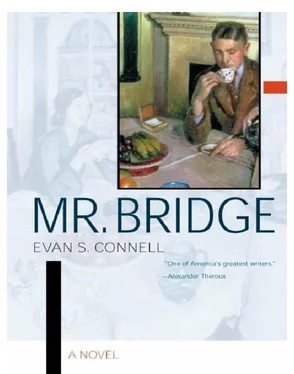“I don’t mind. Who cares what they think?”
“I do not understand this,” his father said. “When I was your age there was no such thing as a high school fraternity. I was unable to join a fraternity until I was at the university. The men I became acquainted with as a result have been extremely useful to me on a number of occasions.”
“We don’t want you to do anything you wouldn’t enjoy. It’s just that we suspect you haven’t quite realized what a good time you might have.”
“Does that mean I’ve got to?”
“Oh, goodness,” she said, and turned despairingly to her husband.
He hesitated. In college the choice of fraternity was important. Some had excellent reputations, and the alumni were influential men. Others were little more than social clubs whose alumni did not amount to much. When it came time to select a college fraternity the matter ought to be discussed thoroughly. A high school fraternity was less important; even so, it was good preparation.
“In my opinion, it would be a mistake not to.”
“But does that mean I’ve got to?”
“You are not listening. The choice is yours. Your mother and I have already told you what we think.”
“Okay,” Douglas said, “as long as it’s up to me I’d just as soon skip the whole business.”
And there, for the time being, the problem rested.
At the middle of the school year, having skipped a semester, Carolyn graduated from high school and was enrolled at the University of Kansas, which was in the town of Lawrence about forty miles from Kansas City. Many of the students had cars and there was frequent bus service, so one way or another she occasionally came home for a night or for the weekend.
Late Saturday night Mr. Bridge was lying in bed reading a mystery novel when he heard the front door open. Mrs. Bridge, who had been dozing, immediately sat up. They heard Carolyn come upstairs, go into her room, and slam the door. Mrs. Bridge got out of bed, put on her robe, and went in to see what was the matter. Half an hour later she came back. He peered at her inquiringly over the top of his glasses.
“She’s terribly upset. There was some sort of a scene with Gil.”
“Who is Gil?”
“She’s mentioned him. Gil Davis. They’ve been running around together. He sounds like a nice boy.”
“What’s the problem?”
“It’s a long story. There was a dance at the university this evening and apparently Arthur Merton was there.”
“The fellow who operates those dancing schools?”
“Yes. I’m not sure how it happened, Carolyn is still too distressed to be very clear, but it appears he invited her to dance and she refused. I understand one of his studios is opening in Lawrence. I suppose that’s how he happened to be there.”
“Now just one minute. Let me get it straight,” Mr. Bridge said. “This Merton fellow asked Carolyn for a dance?”
“As I understand it, yes.”
“Why?”
“I find nothing odd about Mr. Merton inviting Carolyn to dance,” she said resentfully. “Carolyn is quite attractive.”
“I am wondering why he happened to pick her.”
“I didn’t inquire. It doesn’t matter,” she replied, holding her head with her fingertips. “I’m afraid I’m getting another of my spells.” She walked into the bathroom and began to hunt for something in the medicine cabinet.
The conversation was becoming disorganized; he had a feeling that if he asked any more questions it would get worse. She drank a glass of water, shut the door of the medicine cabinet, and went on explaining.
“Carolyn turned Mr. Merton down because she didn’t realize who he was. She assumed he was simply some strange man. And now, of course, she’s just sick.”
“Ah ha!” he said. “I begin to see. But what does that have to do with the boy?”
“Gil? She’s furious with him. I don’t blame her in the least. I would be, too. He recognized Mr. Merton, but for some reason he thought it would be amusing not to tell her.”
“This is all very peculiar,” Mr. Bridge said, and turned the book upside down in his lap. “This Merton fellow was in Lawrence and showed up at a university dance. He invited Carolyn to dance but she refused because she didn’t know who he was. This boy she was with recognized the man but did not tell her. Is that the story?”
“As nearly as I can gather. I think Carolyn is perfectly justified. I don’t blame her one iota for being upset. She’ll never have another opportunity like that. It’s a shame.”
“Well,” Mr. Bridge said after thinking about it, “that is too bad. And if you ask me, this boy she’s running around with is a little cracked. However, I don’t suppose it’s important. Two weeks from now she’ll have forgotten the entire business.”
“Walter Bridge,” she said, walking out of the bathroom with both hands pressed to her forehead, “for once in your life you are as wrong as a man can be.”
Two days later Carolyn reappeared just long enough to get some clothes out of her closet and have a glass of milk and a sandwich. Arthur Merton may not have been forgotten, but he was not mentioned. The sorority was planning an “Arabian Nights” party, and this was all she talked about. A feature of the party was to be a belly dance. She was trying to decide whether or not to be one of the belly dancers. The idea of putting on the costume and dancing for a crowd of fraternity boys obviously excited her, but at the same time she was reluctant to expose herself. She announced that she might do it if they promised to let her dance in the back row. Then, whoever was driving her to the university was in front of the house honking urgently. She swallowed the remainder of her sandwich, drank the rest of the milk, grabbed her clothes and ran for the door.
Observing that his son looked shaggy, Mr. Bridge suggested a haircut. Douglas replied that he could not get a haircut, he could not possibly get a haircut because his external being would not then be in harmony with his inner self.
For a few moments Mr. Bridge considered this. Being unable to make any sense of it, he requested an explanation. Douglas was not merely willing to explain, he was eager to explain, and Mr. Bridge discovered that in the course of miscellaneous reading which seemed to spring from subject to subject with no apparent pattern Douglas had come upon the wisdom of Socrates. Specifically, the inner man should correspond to the outer man.
“This is a commendable philosophy,” Mr. Bridge said. “However, I suggest you visit the barber.”
Douglas repeated that he could not. It was impossible.
Mr. Bridge repeated that it would be good thing to pay a call on the barber, not next month or next week or the day after tomorrow, but tomorrow, preferably in the morning, before school. Otherwise there was not going to be any allowance next Friday, or the Friday after. No allowance until the external being appeared more harmonious to the eye of the spectator. Douglas answered disdainfully that he could get along without an allowance. In fact, rather than accept an allowance any longer he would get a job after school. He would become independent. Mr. Bridge said this was a splendid idea.
A week passed. Douglas began to look remotely Byronic. He had not found a job because he had not looked for one, and because he did not get any allowance he did not have enough money to go bowling with Tipton and Vandermeer, which he wanted to do very much. But still he would not get his hair cut.
Friday afternoon of the fourth week, after school, he borrowed fifty cents from his mother and got the haircut.
Читать дальше












